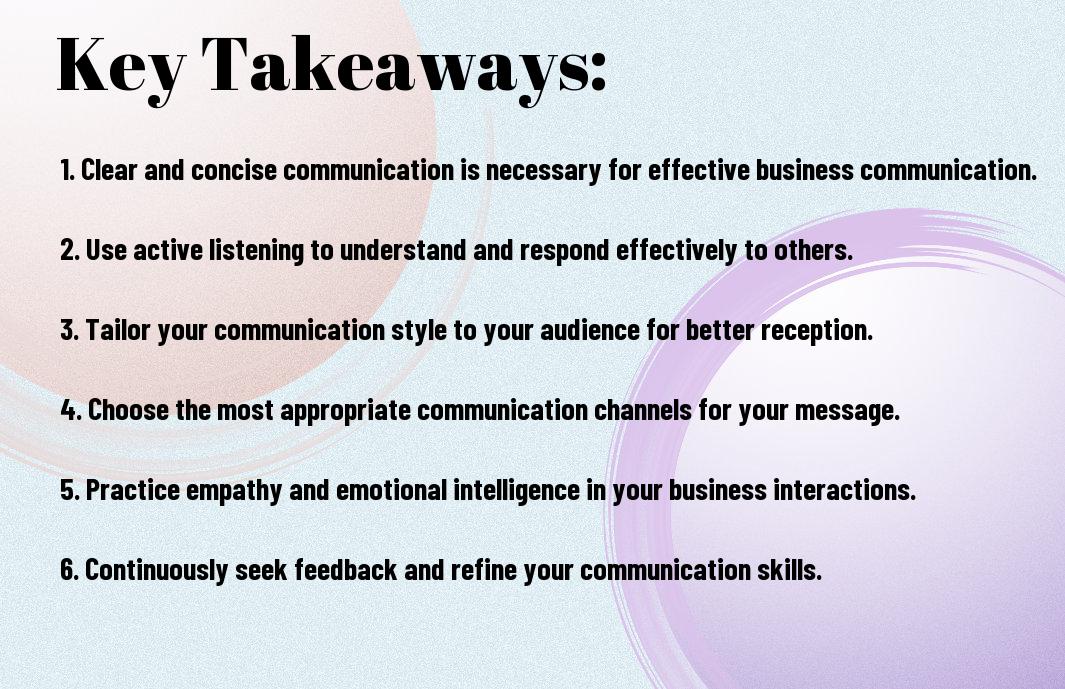Table of Contents
TL;DR: Business Communication Strategies for Success
- Clear communication is vital: Communicate clearly and concisely to avoid misunderstandings and ensure your message is effectively delivered.
- Active listening is crucial: Listen attentively to understand others’ perspectives and demonstrate respect in business interactions.
- Embrace feedback: Solicit feedback from colleagues and clients to improve communication skills and tailor messages for better outcomes.
- Adapt to your audience: Tailor your communication style to fit the preferences and needs of your audience to enhance engagement and understanding.
- Use technology wisely: Leverage technology tools for efficient communication, but also recognize the value of face-to-face interactions for building relationships.
Many businesses undergo challenges due to ineffective communication practices. In today’s fast-paced and digitally connected world, it is crucial for organizations to implement effective communication strategies to ensure success and growth. From clear and concise messaging to active listening and feedback mechanisms, successful communication strategies can boost productivity, foster collaboration, and enhance employee engagement. This blog post will research into the key communication strategies that can propel your business towards success and help you navigate potential pitfalls in the constantly evolving business landscape.

Understanding the Communication Process
Components of Business Communication
Communication in business involves the exchange of information between various parties within and outside the organization. The key components of business communication include verbal communication, written communication, non-verbal cues, listening skills, and feedback. Understanding these components is important for effective communication and successful business interactions.
Barriers to Effective Communication
On occasion, barriers can impede the communication process, hindering the accurate exchange of information. These barriers may include noise, language differences, lack of attention, emotions, cultural differences, and more. Overcoming these barriers is crucial for fostering positive relationships and ensuring messages are conveyed clearly and accurately.
Understanding the barriers to effective communication allows businesses to proactively address and mitigate these obstacles. By acknowledging and overcoming communication barriers, organizations can enhance productivity, minimize misunderstandings, and build stronger relationships with stakeholders. It is important for businesses to prioritize effective communication strategies to achieve success and maintain a competitive edge in the market.
Verbal and Non-Verbal Communication Techniques
Enhancing Verbal Communication
Communication is the key to successful business interactions. In terms of verbal communication, it is vital to focus on clarity, brevity, and empathy. Ensure your message is concise and to the point, using active listening to understand and respond appropriately to the other party. Avoid jargon and technical language that may confuse the listener, and always consider the tone and context of the conversation to deliver your message effectively.
Mastering Non-Verbal Cues
The ability to interpret and use non-verbal cues is crucial in business communication. Non-verbal cues include body language, facial expressions, gestures, and eye contact. These cues can convey more meaning than words alone, influencing the perception of your message. It is important to be aware of your own non-verbal signals, as well as being attentive to the cues of others. Pay attention to subtle signs such as posture, hand movements, and eye contact to ensure effective communication and build trust with your audience.
Mastering non-verbal cues can help you establish rapport with others, convey confidence, and authority in your interactions. By becoming adept at reading and responding to non-verbal cues, you can enhance your communication skills and improve your overall effectiveness in business relationships.

Digital Communication in the Business World
Email Etiquette and Best Practices
To ensure effective communication in the business world, it is important to follow proper email etiquette and best practices. Practices such as maintaining a professional tone, using clear and concise language, and proofreading before sending can make a significant difference in how your messages are perceived by recipients.
Leveraging Social Media for Business Communication
Email is a fundamental tool for business communication, but leveraging social media platforms can also be highly beneficial. It allows businesses to engage with a wider audience, create brand awareness, and provide real-time customer support. It is crucial to choose platforms that align with your target audience and create valuable content that encourages engagement and fosters relationships with customers.

Building a Culture of Open Communication
Encouraging Feedback and Active Listening
Many successful businesses prioritize creating a culture of open communication by encouraging feedback and active listening among team members. For a company to thrive, it is imperative for employees to feel comfortable sharing their thoughts, ideas, and concerns. Active listening, where individuals show attentiveness and empathy towards the speaker, helps foster a collaborative environment where team members feel heard and respected.
Conflict Resolution and Negotiation Skills
Conflict is a common occurrence in the workplace, but how it is managed can make all the difference in maintaining a positive work environment. Developing strong skills in conflict resolution and negotiation can help teams address differences professionally and constructively. By understanding the root causes of conflicts and learning techniques to navigate them effectively, employees can resolve issues and build stronger relationships within the team.
Summing up
So, implementing effective business communication strategies is crucial for achieving success in today’s competitive marketplace. By prioritizing clear and concise messaging, active listening, and adapting communication styles to different audiences, organizations can build strong relationships, foster collaborative spirit, and enhance overall productivity. Developing a culture that promotes open and honest communication, both internally and externally, can also lead to improved problem-solving, innovation, and sustained growth. Note, effective communication is the key to unlocking opportunities and driving success in the business world.
FAQ
Q: Why is effective business communication important for success?
A: Effective business communication is important for success because it helps in building strong relationships with clients, employees, and stakeholders. Clear and concise communication ensures that everyone is on the same page, minimizes misunderstandings, and boosts productivity.
Q: What are the key components of successful business communication strategies?
A: The key components of successful business communication strategies include active listening, clarity in message delivery, empathy, choosing the right communication channel, and feedback mechanisms. These components help in fostering a conducive communication environment.
Q: How can businesses improve their written communication skills?
A: Businesses can improve their written communication skills by ensuring that messages are clear, concise, and free of errors. Using professional language, proper formatting, and addressing the recipient appropriately are also important aspects of effective written communication.
Q: What role does nonverbal communication play in business interactions?
A: Nonverbal communication plays a crucial role in business interactions as it includes gestures, body language, facial expressions, and tone of voice. Paying attention to nonverbal cues can help in understanding the true meaning behind a message and building rapport with others.
Q: How can businesses handle communication challenges and conflicts effectively?
A: Businesses can handle communication challenges and conflicts effectively by promoting open dialogue, active listening, and seeking to understand the perspectives of all parties involved. Implementing conflict resolution strategies and regular feedback mechanisms can also help in addressing communication issues proactively.




